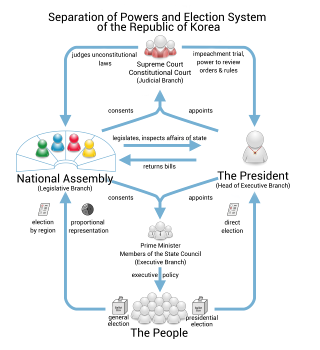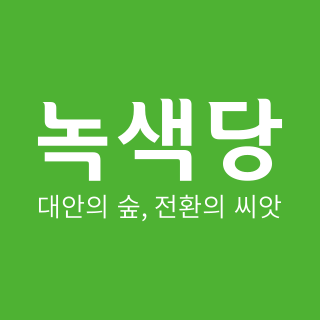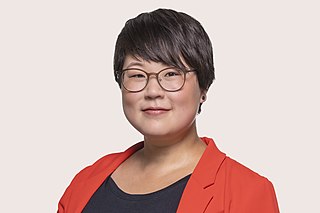Related Research Articles

The politics of South Korea take place in the framework of a presidential representative democratic republic, whereby the president is the head of state, and of a multi-party system. To ensure a separation of powers, the Republic of Korea Government is made up of three branches: legislative, executive, and judicial. The government exercises executive power and legislative power is vested in both the government and the National Assembly. The judiciary is independent of the executive and the legislature and comprises a Supreme Court, appellate courts, and a Constitutional Court.
The Liberty Korea Party was a conservative political party in South Korea that was described variously as right-wing, right-wing populist, or far-right. Until February 2017, it was known as the Saenuri Party, and before that as the Hannara Party from 1997 to 2012, both of which are still colloquially used to refer to the party. The party formerly held a plurality of seats in the 20th Assembly before its ruling status was transferred to the Democratic Party of Korea on 27 December 2016, following the creation of the splinter Bareun Party by former Saenuri members who distanced themselves from President Park Geun-hye in the 2016 South Korean political scandal.

The United Liberal Democrats was a right-wing conservative political party in South Korea, whose support mostly came from the North Chungcheong and South Chungcheong regions. The short Korean name is Jaminryeon.

The Democratic People's Party is a minor conservative political party of South Korea. It was formed in 2000 by disaffected members of the Grand National Party. In the 2000 election, two members were elected to the National Assembly.

The People First Party, was a political party in South Korea, led by Sim Dae-pyung and Shin Kook-hwan. A breakaway from the United Liberal Democrats, its profile was conservative. The party was based in the central provinces of Chungcheong. It had five seats in the South Korean parliament.
The Liberal Party was a far-right corporatist and anti-communist political party in South Korea established in 1951 by Syngman Rhee.
Left-wing nationalism or leftist nationalism is a form of nationalism which is based upon national self-determination, popular sovereignty, and left-wing political positions such as social equality. Left-wing nationalism can also include anti-imperialism and national liberation movements. Left-wing nationalism often stands in contrast to right-wing politics and right-wing nationalism.
The People's Participation Party was a political party of South Korea. It was formed by many of the former members of the Uri Party after the death of former President Roh Moo-hyun. Rhyu Si-min was elected as Party Chairman on March 19, 2011. In March 2011 it had 45,335 members. For the April 27 by-elections, the People's Participation Party has cooperated with the Democratic Party to enter Lee Bong-su as the single opposition candidate for the Kimhae seat in the National Assembly of South Korea. On 5 December 2011, it merged into the Unified Progressive Party.
The Hannara Party was a political party in South Korea. While former chairman Lee Tae Hee argued that the party succeeded Hwanin and Hwanung, the Liberty Korea Party argued that Hannara had stolen the Saenuri Party's older name to confuse conservative voters. However, the South Korean National Party Commission (중앙선관위) supported the legality of the name.
The Labor Party (Korean: 노동당) is a democratic socialist political party in South Korea.

Green Party Korea is a political party in South Korea. The party was established in March 2012. It is a continuation of the Korea Greens, created following initial discussions in 2011. The party was established in response to the Fukushima Nuclear Crisis of Japan. Green Party Korea is a member of the Global Greens and the Asia Pacific Greens Federation.
Progressive Party was a short-lived moderate left political party founded after the Korean War in South Korea under the leadership of Cho Bong-am. It was a major political force from 1956 to 1958, and fell apart in 1959.
The Liberty Unification Party is a political party in South Korea established on March 3, 2016. Until 2020, it was known as the Christian Liberty Party (Korean: 기독자유당), and following that until 14 June 2021 as the Christian Liberty Unification Party. Representatives of a range of Christian organizations including the Christian Council of Korea and the Communion of Churches in Korea attended the party's founding convention.

The Democratic Party was a centrist political party in South Korea established on September 21, 2014. The party had one representative in the 19th National Assembly, Shin Ki-nam, formerly a member of the Minjoo Party of Korea. The party lost its seat in the 2016 legislative election. In October 19, 2016, the party officially merged with the Democratic Party of Korea.

The People's United Party was a left-wing political party in South Korea that was formed on 27 February 2016. Many of its members came from the Unified Progressive Party.
The Future Democratic Party was a pro-Lee Jae-myung political party in South Korea.

The Central Committee of the Workers' Party of South Korea (WPSK) was elected by the party congress on 24 November 1946 through the merger of the Communist Party of South Korea, New People's Party of Korea and a faction of the People's Party of Korea, and remained in session until the merger of the WPSK with the Workers' Party of North Korea on 24 June 1949. In between party congresses the Central Committee was the highest decision-making institution in the WPSK. The Central Committee was not a permanent institution and delegated day-to-day work to elected bodies, such as the Political Committee and the Standing Committee in the case of this Central Committee. It convened meetings, known as "Plenary Session of the [term] Central Committee", to discuss major policies. A plenary session could be attended by non-members. These meetings were known as "Enlarged Plenary Session".
The Central Committee of the Communist Party of Korea (CPK) was elected by the party congress on 14 September 1945, and remained in session until the formation the Workers' Party of South Korea and its Central Committee on 24 November 1946. In between party congresses the Central Committee was the highest decision-making institution in the CPK. The Central Committee was not a permanent institution and delegated day-to-day work to elected bodies, such as the Politburo, Secretariat and the Organisational Bureau in the case of this Central Committee. It convened meetings, known as "Plenary Session of the [term] Central Committee", to discuss major policies. A plenary session could be attended by non-members. These meetings were known as "Enlarged Plenary Session".

Ye-One Rhie is a German politician of Korean descent who has been serving as a member of the Bundestag since the 2021 German federal election, representing the Aachen I district.
References
- ↑ Andrew C. Nahm; James Hoare (2004). Historical Dictionary of the Republic of Korea. Scarecrow Press. p. 150. ISBN 978-0-8108-4949-5.